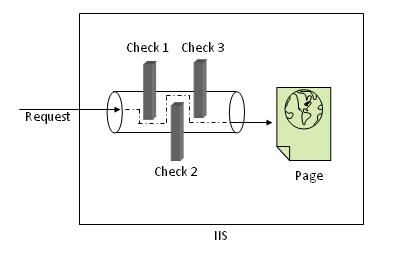Introduction
This post basically explains how an authentication can happen at the IIS level.
Background
It all happened when I interviewed a guy with quite a good amount of experience, I then noted that many experienced guys lacked the so called basics. I remember asking him this question; “I would want to authenticate the user as a valid user even before the request hits the page, I don't want to use Forms or Windows authentication”. The answer I got back was terrible – the candidate replied saying the check can be done at either page_load or page_init.
Explanation
In my post http://bloggingbunk.com/2011/07/net-in-depth-understanding-request-life-cycle/, I discussed about 2 main elements:
HttpModuleHttpHandler
For any request, the IIS first calls the HttpModule then the HttpHandler then the Page and then the HttpModule.
In your project, while designing on the asp pages, create a class which will inherit iHttpModule. This class will implement all the methods of HttpModule. Now put your authentication code at BeginRequest. For e.g., say your project stores important data persisted in cookies; send the cookie information alongside of the request. The following figure depicts how your request will fetch the page. The pipe represents the HttpModule and the HttpHandler.

Now, these checks that you see can be a call to the DB or to any authentication system or even to an Access Control Policy routine.
With the HttpModules being handy, we have the leverage to do anything before the request hits the page.
This goes on to say that while the page life cycle is complete-HttpModule can also help us in doing any operation under EndRequest; it can be a check for the response or anything.
You can have more security in place if you can leverage HttpModule’s: BeginRequest, AuthoriseRequest and EndRequest along with HttpHandler’s: ProcessRequest.
Conclusion
Basically to sum it up - this methodology gracefully carries our pipeline pattern. Hope you understood the Authentication at IIS. Please shoot your questions as comments and I will reply.
